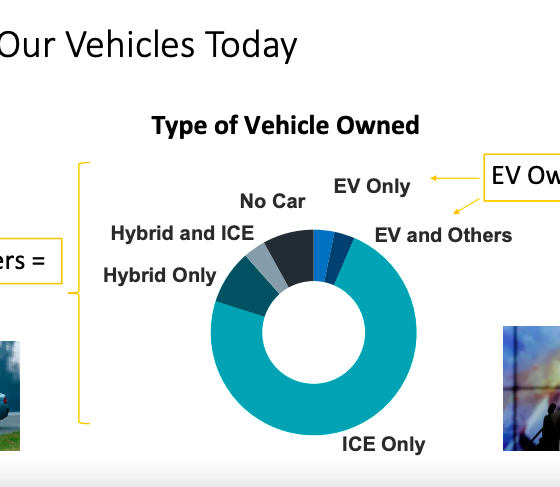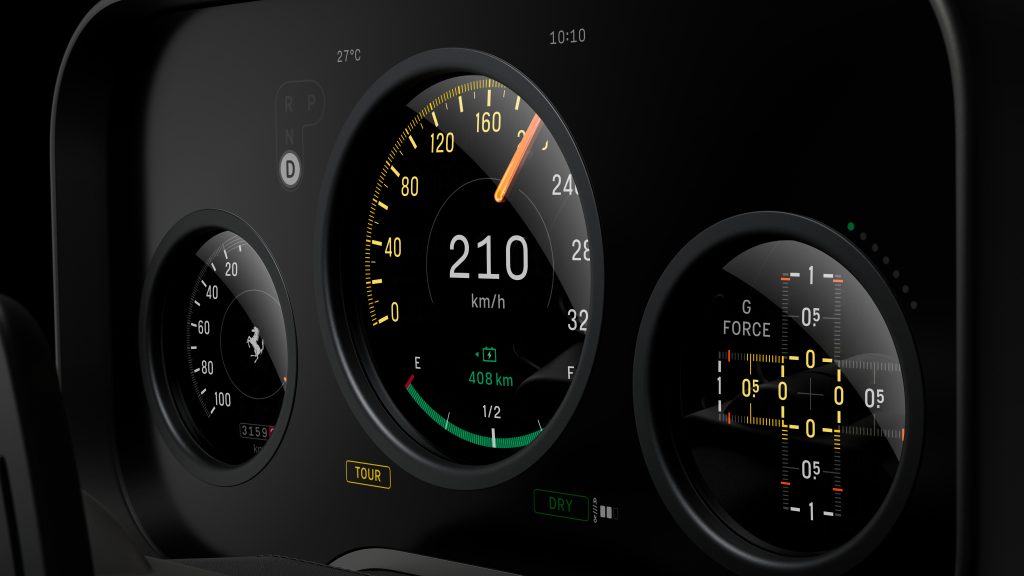A new study shows that only 26% of U.S. households are familiar with EVs but this is about to change. In the recent study by Parks Associates, it was noted that as Tesla became a household name, purchase intention for EVs has gone up 6%.
I wrote about this here, and Teslarati was invited to attend to the virtual session where Chris White, the senior analyst who conducted the study, led a virtual presentation.
According to the study,
“Only 26% of US broadband households report high familiarity with electric vehicles but that’s about to change. These sessions address the coming surge of EVs on the market, the potentially explosive EV growth in adoption, and the implications for consumers, the grid, and needed infrastructure.”
Electric Vehicles: A New Era for Consumers
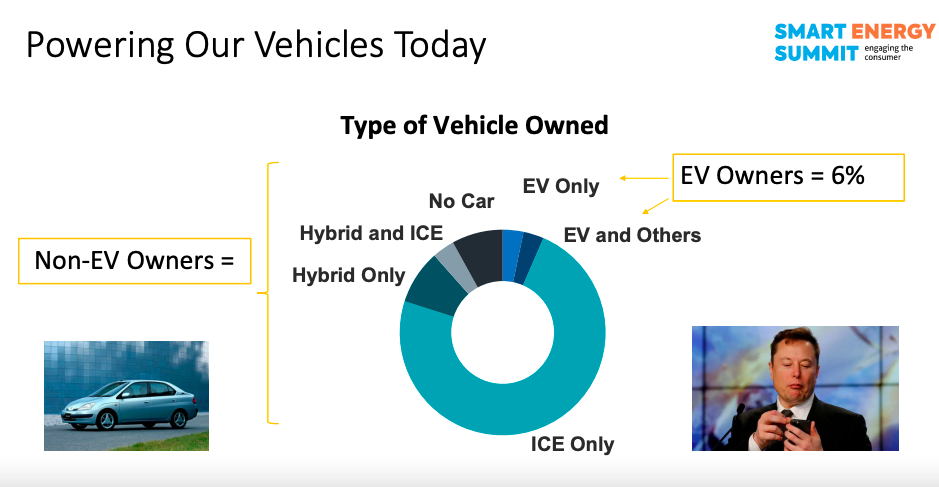
During the virtual session, Chris White explained some of the findings of the study. Some of these include current EV owner demographics, EV owner interest in clean energy, EV owners’ high-tech affinity, lack of knowledge of EV features, and how other issues such as the chip shortage are affecting both EV and non-EV markets.
The report was based on data from Q4 2021.
Understanding Current EV Owners
Current EV owners are young affluent and have dual incomes. Many are from a multifamily environment and use their EVs for work and school.
They use their vehicles regularly. It’s important to highlight since EVs have the image of a rare or exotic car that doesn’t have enough range. This is changing.
As the EV market continues to grow, the demographics of the current EV owners will most likely change. For now, there’s a 16% high intention of purchasing EVs among non-owners. Previous that was 10%.
That number didn’t include the current EV owners who either want to add a new EV or replace an old one.
EV Owners 3x likely to use renewable energy
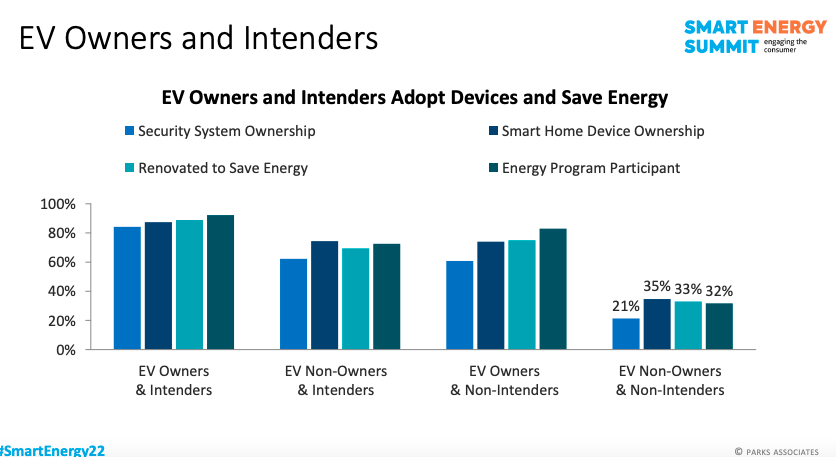
Chris White’s research showed that EV buyers are three times more likely to live in solar communities or have an interest in renewable energy powering their homes. They are also 2.5 to 5 times more willing to pay more for renewable energy.
The research shows that EV owners care about their carbon footprint and the impact on the environment.
EV owners are much more likely to own a security system or a smart home device than non-EV owners, according to the research
They xcare about technology and have a higher affinity for tech than non-EV owners.
Lack of familiarity with EV features.
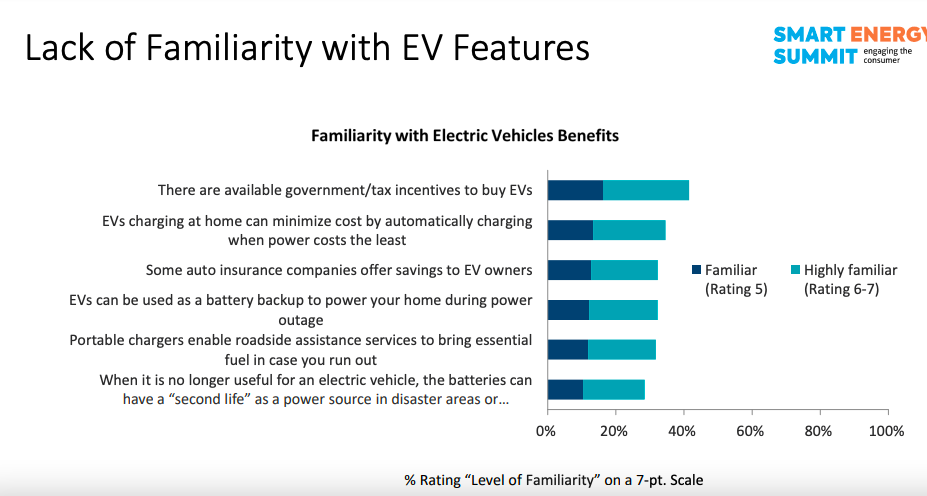
One of the key points in the study shows that although EVs are more popular today, there is a lack of familiarity with their features.
Chris pointed out that 18% of the consumers polled indicated familiarity with EV features. That isn’t a lot.
Features that many aren’t familiar with include EV charging at home minimizing cost when automatically charging during off-peak hours, auto insurance savings for EV owners, second-life EV batteries reused as a power source in disaster areas, and available tax incentives.
Second-life EV batteries are expected to reach over $34 billion by 2027 according to Research and Markets. You can read more about this here.
EV Features that could persuade non-owners to buy an EV
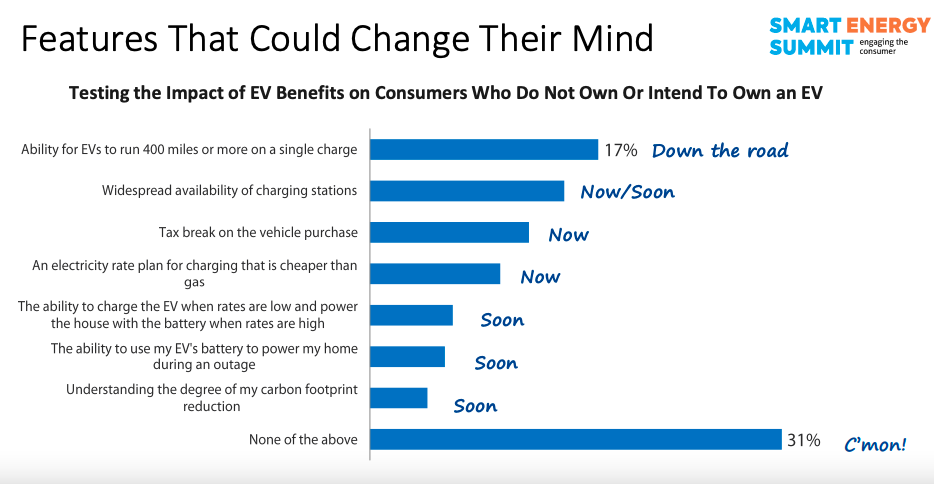
The study included the top features that could persuade non-EV owners to switch to electricity. The number one feature was for an EV to run 400 miles or longer on a single charge.
During the session, Chris pointed out that this is still rare and that most EVs are in the 200-300 mile range.
Other features included widespread charging stations and electricity plans that make owning an EV more affordable than owning an ICE vehicle. These are coming and soon people will see for themselves that EVs meet the criteria they are looking for.
Purchase Inhibitors.
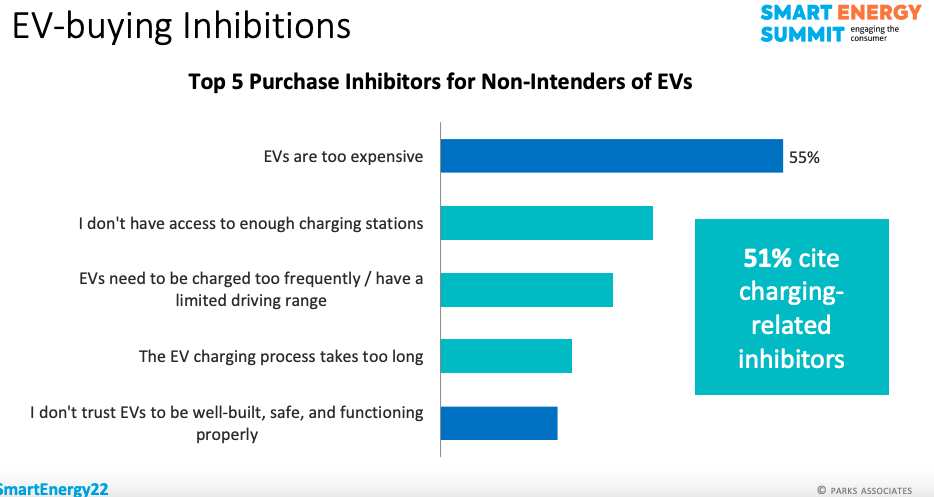
The number one purchase inhibitor that non-EV owners are concerned about are the cost of an EV and charging.
The research showed that 51% of the consumers who participated in the study cited charging-related issues.
Another issue was the lack of trust in the design of EVs,
Issues that impact both EV and non-EV purchases
We often see issues such as the semiconductor chip shortage and critical minerals for EV batteries impacting the EV market. However, something that impacts both markets includes the chip shortage, Putin invading Ukraine, and the national gas prices being on the rise.
The latter can create pain at the pump which is something that encourages people to make the switch to EVs. Last month, I wrote about Dobson who purchased a Tesla due to several factors but especially high gas prices.
EVs will be everywhere soon.
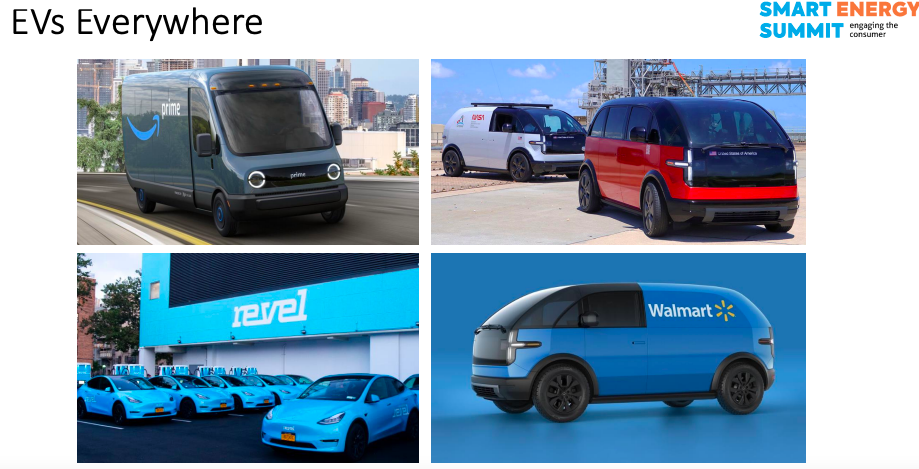
The research also revealed that soon, EVs will be everywhere.
Chris spoke about the Amazon and Rivian partnership, Walmart’s purchase of Canoo EVs, Revel’s fleet of Tesla taxis in New York, and the contract between NASA and Canoo.
And this is just on the commercial side. Other automakers are producing and marketing their own EVs to compete with Tesla.
Disclaimer: Johnna is long Tesla.
I’d love to hear from you! If you have any comments, concerns, or see a typo, you can email me at johnna@teslarati.com. You can also reach me on Twitter @JohnnaCrider1

News
Ferrari Luce EV: Italian supercar maker reveals interior and interface design
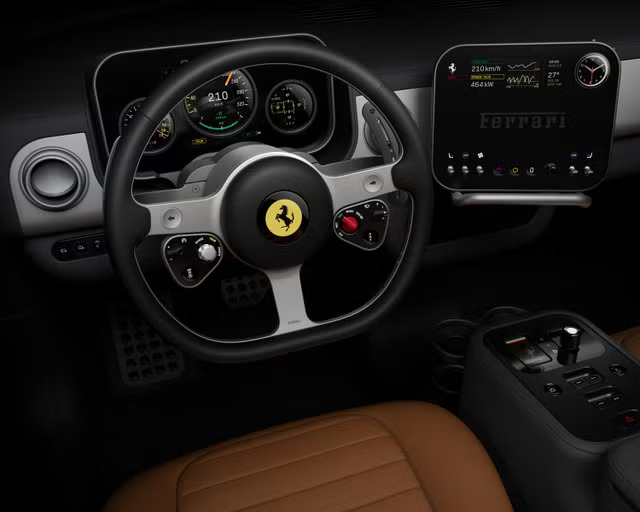
Ferrari, the Italian supercar maker, has revealed the name, interior, and interface design of its first-ever electric vehicle project, the Luce, initiating a new chapter in the rich history of the company’s automotive books.
This is the first time Ferrari has revealed such intimate details regarding its introductory EV offering, which has been in the realm of possibility for several years.
As more companies continue to take on EV projects, and some recede from them, supercar companies like Ferrari and Lamborghini are preparing to offer electric powertrains, offering super-fast performance and a new era of speed and acceleration.
Luce – a New Chapter in Ferrari
The company said that the name Luce is “more than a name. It is a vision.” Instead of looking at its first EV offering as a means to enter a new era of design, engineering, and imagination. The company did not want to compromise any of its reputation, high standards, or performance with this new project. It sees it as simply a page turn, and not the closing of a book:
“This new naming strategy reflects how the Ferrari Luce marks a significant addition to the Prancing Horse’s line-up, embodying the seamless expression of tradition and innovation. With its cutting-edge technology, unique design, and best-in-class driving thrills, it unites Ferrari’s racing heritage, the timeless spirit of its sports cars, and the evolving reality of contemporary lifestyles. It testifies to Ferrari’s determination to go beyond expectations: to imagine the future, and to dare. Because leading means illuminating the path ahead – and Luce embodies that mindset.”
Ferrari Luce Design
Ferrari collaborated with LoveFrom, a creative collective founded by Sir Jony Ive and Marc Newson. The pair has been working with Ferrari for five years on the Luce design; everything from materials, ergonomics, interface, and user experience has been designed by the two entities.
The big focus with the interior was to offer “a first, tangible insight into the design philosophy…where innovation meets craftsmanship and cutting-edge design. The team focused on perfecting and refining every solution to its purest form — not to reinvent what already works, but to create a new, carefully considered expression of Ferrari.”
RELATED:
Ferrari CEO compliments Tesla for shaking up the automotive industry
The company also said:
“Ultimately, the design of the Ferrari Luce’s interior is a synthesis of meticulous craftsmanship, respect for tradition, and thoughtful innovation. It offers a new choice for Ferrari enthusiasts – one that honours the past while embracing the future, and exemplifies the brand’s enduring commitment to quality, performance, and cultural significance.”
The appearance of the elements that make up the interior are both an ode to past designs, like the steering wheel, which is a reinterpretation of the iconic 1950s and 1960s wooden three-spoke Nardi wheel, and fresh, new designs, which aim to show the innovation Ferrari is adopting with this new project.
Interior Highlights
Steering Wheel
The Ferrari Luce is a shout-out to the Nardi wheel from the 1950s and 60s. It is constructed of 100% recycled aluminum, and the alloy was developed specifically for the vehicle to “ensure mechanical resistance and a superb surface quality for the anodisation process.”
It weighs 400 grams less than a standard Ferrari steering wheel:

Credit: Ferrari
It features two analogue control modules, ensuring both functionality and clarity, Ferrari said. The carmaker drew inspiration from Formula One single-seaters, and every button has been developed to provide “the most harmonious combination of mechanical and acoustic feedback based on more than 20 evaluation tests with Ferrari test drivers.”
Instrument Cluster and Displays
There are three displays in the Luce — a driver binnacle, control panel, and rear control panel, which have all been “meticulously designed for clarity and purpose.”
The binnacle moves with the steering wheel and is optimized for the driver’s view of the instrumentation and supporting driver performance.
- Credit: Ferrari
- Credit: Ferrari
Displays are crafted by Samsung and were specifically designed for the car, using a “world first – three large cutouts strategically reveal the information generated by a second display behind the top panel, creating a fascinating visual depth that captures the eye.”
Samsung Display engineers created an ultra-light, ultra-thin OLED panel for the vehicle.
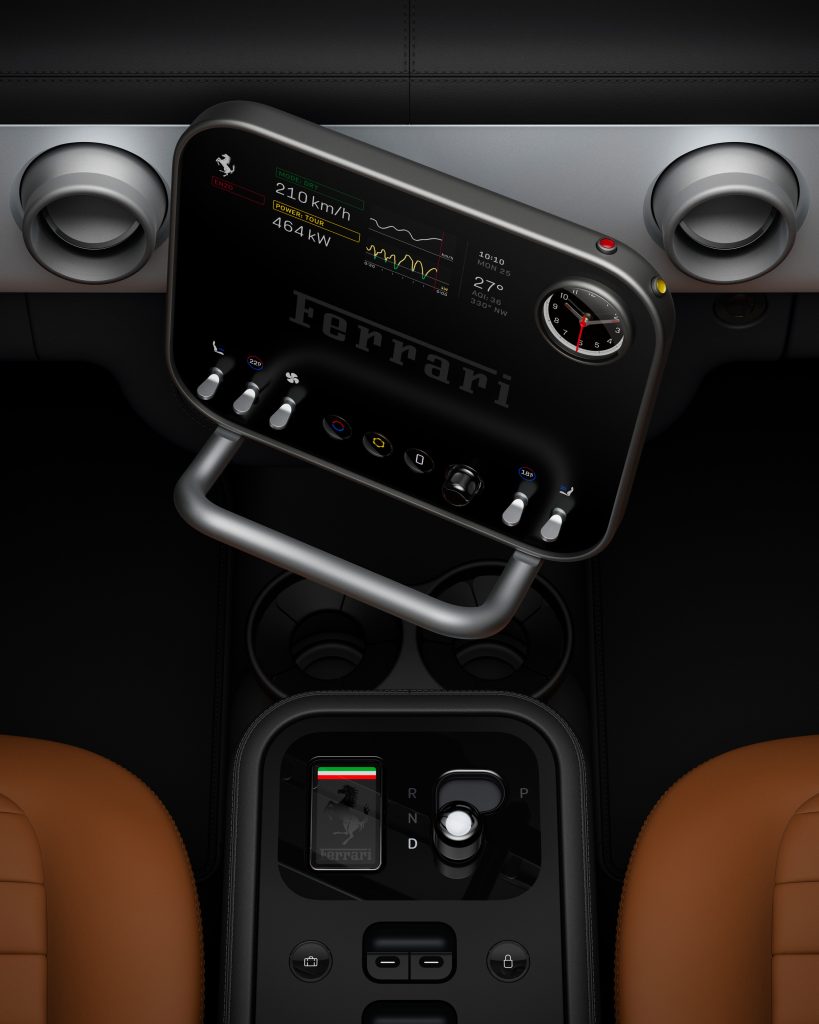
Credit: Ferrari
Pricing is still what remains a mystery within the Luce project. Past reports have speculated that the price could be at least €500,000, or $535,000.
Elon Musk
Elon Musk pivots SpaceX plans to Moon base before Mars
The shift, Musk explained, is driven by launch cadence and the urgency of securing humanity’s long-term survival beyond Earth, among others.
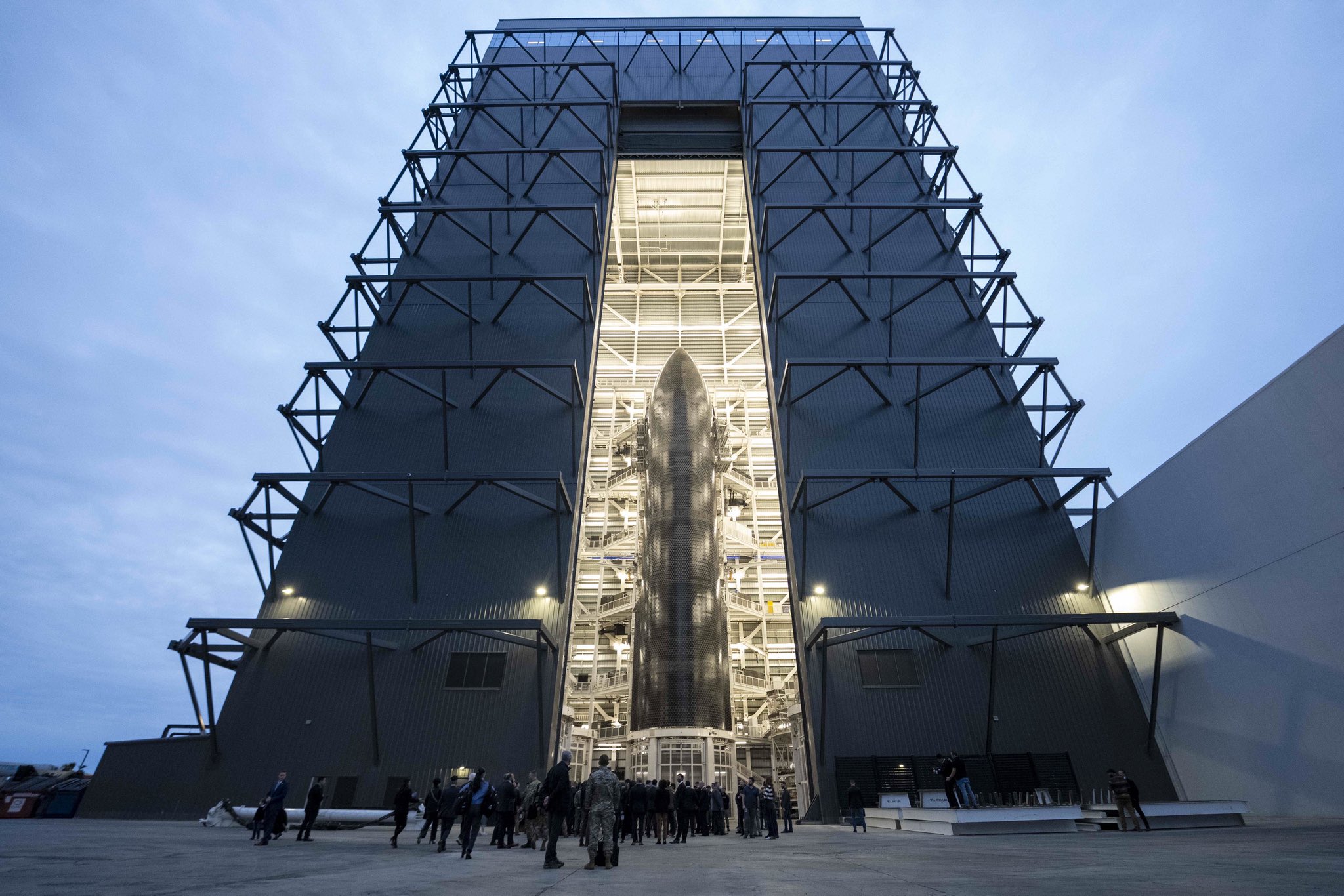
Elon Musk has clarified that SpaceX is prioritizing the Moon over Mars as the fastest path to establishing a self-growing off-world civilization.
The shift, Musk explained, is driven by launch cadence and the urgency of securing humanity’s long-term survival beyond Earth, among others.
Why the Moon is now SpaceX’s priority
In a series of posts on X, Elon Musk stated that SpaceX is focusing on building a self-growing city on the Moon because it can be achieved significantly faster than a comparable settlement on Mars. As per Musk, a Moon city could possibly be completed in under 10 years, while a similar settlement on Mars would likely require more than 20.
“For those unaware, SpaceX has already shifted focus to building a self-growing city on the Moon, as we can potentially achieve that in less than 10 years, whereas Mars would take 20+ years. The mission of SpaceX remains the same: extend consciousness and life as we know it to the stars,” Musk wrote in a post on X.
Musk highlighted that launch windows to Mars only open roughly every 26 months, with a six-month transit time, whereas missions to the Moon can launch approximately every 10 days and arrive in about two days. That difference, Musk stated, allows SpaceX to iterate far more rapidly on infrastructure, logistics, and survival systems.
“The critical path to a self-growing Moon city is faster,” Musk noted in a follow-up post.
Mars still matters, but runs in parallel
Despite the pivot to the Moon, Musk stressed that SpaceX has not abandoned Mars. Instead, Mars development is expected to begin in about five to seven years and proceed alongside the company’s lunar efforts.
Musk explained that SpaceX would continue launching directly from Earth to Mars when possible, rather than routing missions through the Moon, citing limited fuel availability on the lunar surface. The Moon’s role, he stated, is not as a staging point for Mars, but as the fastest achievable location for a self-sustaining off-world civilization.
“The Moon would establish a foothold beyond Earth quickly, to protect life against risk of a natural or manmade disaster on Earth,” Musk wrote.
News
Elon Musk confirms Tesla Semi will enter high-volume production this year
Musk shared his update in a post on social media platform X.
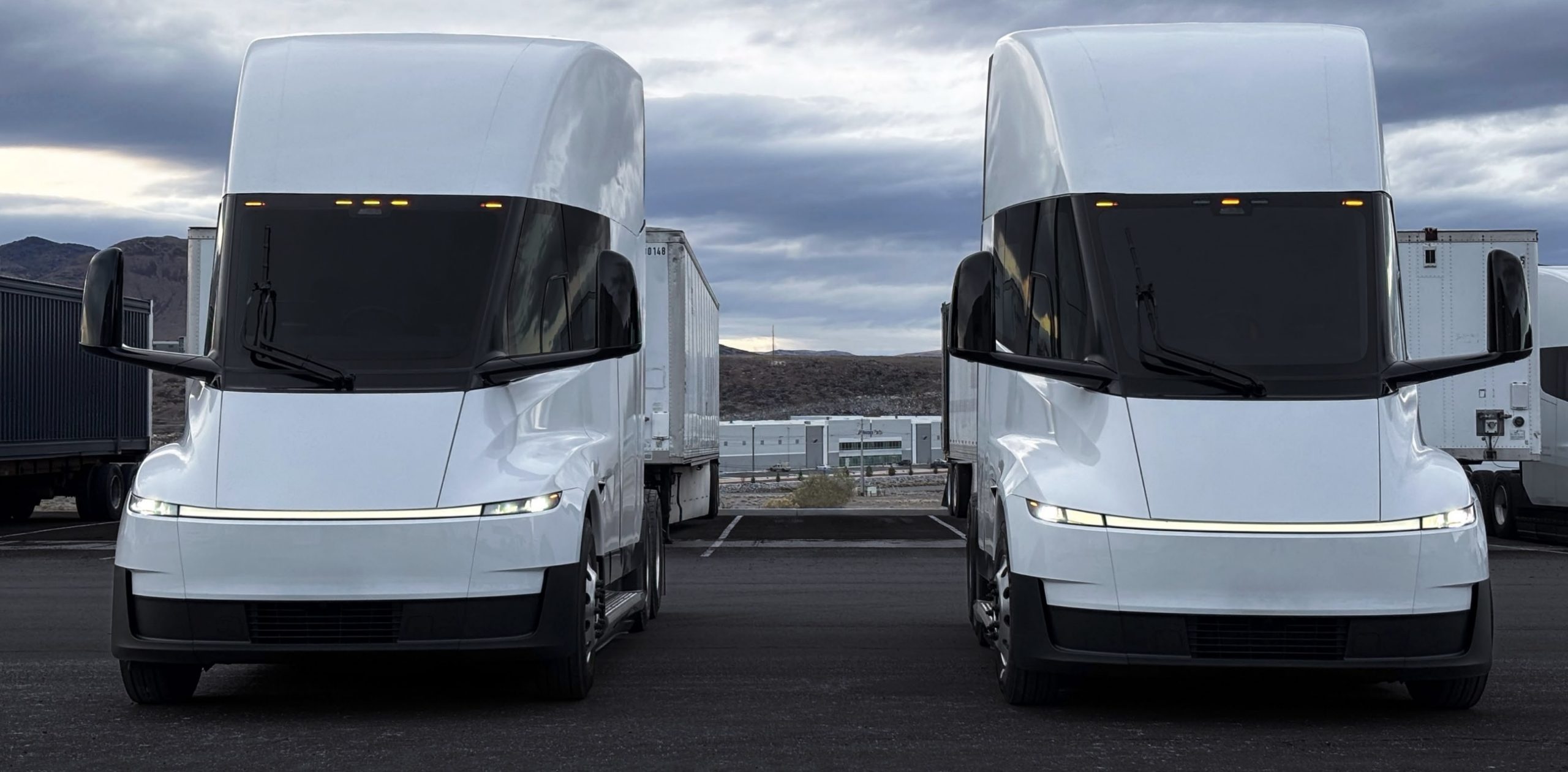
Elon Musk has confirmed that Tesla will begin high-volume production of the Class 8 all-electric Semi this year.
He shared his update in a post on social media platform X.
Musk confirms Tesla Semi production ramp
Tesla CEO Elon Musk reaffirmed on X that the Semi is finally moving into volume production, posting on Sunday that “Tesla Semi starts high volume production this year.”
The update comes as Tesla refreshed its Semi lineup on its official website, an apparent hint that the program is transitioning from limited pilots into wider commercial deployment. As per Tesla’s official website, two variants of the Semi will be offered to consumers: Standard and Long Range.
The Standard trim offers up to 325 miles of range with an energy consumption rating of 1.7 kWh per mile and a gross combination weight rating of 82,000 pounds. The Long Range version pushes driving range to 500 miles, with Tesla noting a higher curb weight of about 23,000 pounds, likely due to a larger battery pack.
Both trims support fast charging, with Tesla stating that the Semi can recover up to 60% of its range in 30 minutes using compatible charging infrastructure.
Broader Tesla Semi rollout
Tesla has already delivered production Semi units to select partners, including snack and beverage giant PepsiCo as well as logistics behemoth DHL, which confirmed that its truck operates daily in California, traveling roughly 100 miles per day and requiring charging just about once a week.
The company has also partnered with Uber Freight, as noted in a Benzinga report, with Tesla executives previously describing the agreement as a way for fleet operators to experience the Semi’s lower operating and maintenance costs firsthand.
With Musk now publicly committing to high-volume production, the Semi appears poised to move beyond pilot programs and into scaled commercial use, an important step in Tesla’s wider push to electrify heavy-duty and long-range trucking.
